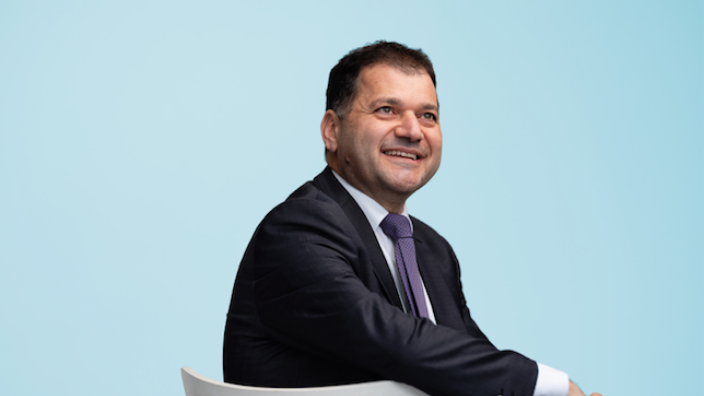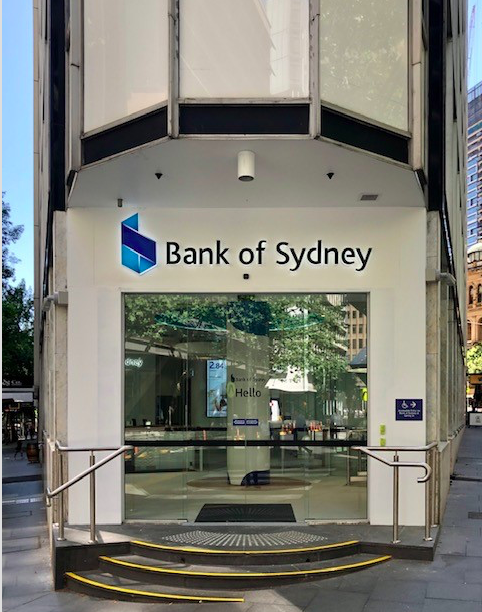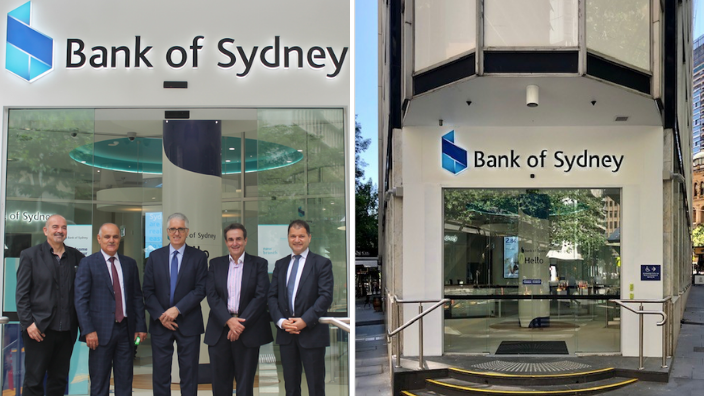In April 2020, in an interview with The Greek Herald the CEO of Bank of Sydney, Miltos Michaelas, carefully and thoroughly drew the road map of what would be next as a result of the pandemic. All of which has come true in the last 7 months, from an economy and financial perspective, how it affected the community and what the plan was for recovery.
Today, it feels like he had a crystal ball through which he saw the future. In fact, his knowledge and experience in the banking sector was his very own crystal ball.
Guided by an experienced board of directors and supported by a strong team of executives, Michaelas managed to safely and successfully lead the Bank of Sydney and its employees to a safe harbour through unprecedented times, from where they then were able to help the Bank’s communities and clients, especially those affected by the pandemic.
Although Australia recently entered its first recession in three decades, economic indicators show that there is light at the end of the tunnel, Mr. Michaelas predicted and now confirms to The Greek Herald.
But there is one common question. When will the economic downturn come to an end?
“The light at the end of the tunnel is now visible. We see the evidence of this in the big number of people who are back to repaying their loans. The data from banking institutions, which reflects people’s pockets, paints a very positive picture forming.
“I must note, that Australia has managed to control the health crisis better than many other countries around the world. The measures taken from the beginning of this pandemic were strict. However, the Australian society was mature enough to embrace and follow them. One of the most dramatic measures has been the closure of borders,” Michaelas says.
“Despite the financial impacts caused by the pandemic, Australia with its AAA credit rating was able to maintain a stable outlook and give the system strong economic boosts in order to survive. Spending money while at the same time maintaining an optimal rating, the country managed to “build” a sustainable bridge to cross safely to the other side, beyond the recession imposed by the pandemic.
“Public debt reached 43% – 44% including all the resources thrown into battel against the effects of the pandemic but Australia will not have any problem with the extra lending,” says Michaelas and he goes on to explain why.
“For three reasons. The first reason is because Australia has always had and continues to have very low debt, despite the new large investment in the lifeline. Secondly, lending interest rates have dropped dramatically, due to a number of actions which created cheap liquidity that according to the Head of the Reserve Bank of Australia will remain in place for at least the next two to three years. Third reason is because, with a return to normality, exports will flourish. Thus, cheap borrowing will lead to investments, and this will lead the government as well as the citizens towards a faster V-shape recovery,” says Mr. Michaelas, only to confirm what he told The Greek Herald seven months ago. “We should now worry more about over-heating and immigration trends which will define the economy in the medium term, next 2-3 years.”

‘Greece and Cyprus will overcome the crisis’
If in Australia the economic recession seems to be heading towards its completion, in Greece and Cyprus the new strict measures taken to stop the spread of the second wave of coronavirus have triggered a new round of recession.
“In Greece and Cyprus the situation is unique, due to the fact that the tourist season is lost and that infections are still rising,” Mr Michaelas says.
“I hope we can resolve this health crisis, endure the next few months and find before us an Easter of Resurrection and the path to economic recovery. Greece has now the European Union funds and enough time to plan its recovery. Signs of recovery were already visible before the pandemic. The 2021 tourist season is the only bet left that needs to be won.
“Greece and Cyprus have managed to overcome difficult situations and will be able to overcome this as well.
“Cyprus is in slightly better position but its economy is small. For example, the recent issue of the Golden passports scheme could cause a major downturn in an economy with a GDP of around € 18 billion.
“The pandemic is obviously affecting the country’s economy but this double-up of problems may affect severely a small islands Construction and tourist sectors. Especially at a time that Cyprus has not yet recovered from the real estate sector crisis in 2013,” the Greek-Cypriot CEO explains.
“Cyprus is stronger than Greece, in terms of economy and private wealth, but it’s particularly hard for a country with a small economy, like Cyprus, to manage two blows simultaneously”.
Accelerating investments and strengthening customer relationships
In his previous interview, in April 2020, the CEO’s appeal to the Bank of Sydney’s customers who had been impacted by the pandemic, revealed the banking organisation’s humane and compassionate side.
“We did not receive many phone calls from customers for hardship. We then decided to call our customers ourselves, one by one, to ask if and how they have been impacted by the pandemic.
“I can proudly say that we are the only bank that contacted all the customers who have loans and cared about their wellbeing in a 100% way. This is the cheapest investment I have made in my career,” confesses Michaelas.
As we move towards the end of the year, the market trend is clearly returning to normal as more customers bounce back to their pre-pandemic instalments and according to Mr Michaelas, the Bank of Sydney has far less overdue customers compared to other financial institutions.
“We have a small number of customers who remain on instalment suspension. More than 75% of customers who had previously requested an instalment suspension now serve their loan regularly. At the end of this year, we will get to a point where we will discover that ‘a strong wind passed over us and not a tornado. As a bank we pioneered because we went to the customer when the wind started blowing”.
So what is the state of the recession at the Bank of Sydney and what were the steps taken to absorb the shocks of the economic impact?
“The first thing we did at the beginning of this adventure, as I mentioned in the previous interview, was to protect our employees and our customers.
“This approach resulted in us strengthening our relationship with both sides. The bank managed to operate with 90% of the staff working from home -this continues to date. We are not in a hurry to get them back to the office, as we have managed to be efficient with staff working remotely,” says Michaelas.
“As far as the bank is concerned, we tried to predict and calculate how the situation will unfold from March 2020 to around October 2021, when we estimate that this health crisis will end. We expect that within these 18 months, the way that our customers transact will change in a dramatic and irreversible way, as the new digital process will become habitual”.
“So, as early as April we made the decision to expedite the bank’s investment program, which would have been otherwise completed in three years. We decided to invest and implement the changes earlier in order to take advantage of the best prices that existed at that time and be ready in 2021, when the market will start moving again.”
But is the banking industry going to be the same in the post pandemic era?
“Unfortunately, the coronavirus pandemic will be the end of the banking industry as we know it. I am referring to physical bank branches, cash and checks, all kinds of physical transactions. The aforementioned total banking transactions have been already reduced to 5 – 10% as Australia is rapidly moving towards becoming a cashless society.
“As of that, the automation of “Bank of Sydney”, its market share and the cost reduction in our customer service channels and investments, had to be actioned from now until mid-2021 so that we are ready for the competition and to maintain our dynamic clientele, that transforms and changes habits with time. We also have younger generations of clients, who constantly ask for more advanced products,” Mr. Michaelas says.

The Bank of Sydney Values
During an extremely difficult time for the country and for the planet, relationships are undeniably being tested. But the bonds created in such times, are strong and this is where Bank of Sydney has invested. In relationships are based on values and humane interaction.
“Undoubtfully, our goal is to provide our customers with a seamless online service, equal to what’s out in the market. Humane interaction though is what always differentiates Bank of Sydney.
“This is the bank’s greatest strength,” says Michaelas.
“The success of “Bank Of Sydney” for the last 20 years has been built on the foundations of this the interaction with our clients and our values, which have been forged by being close to the Greek community. The Greek community is very demanding and when you manage to satisfy its members and earn their trust with your quality services, you can stand tall, in any environment,” the CEO explains, as he unfolds the triptych of the institution’s values.
- Values: We approach every customer with respect and honesty, regardless of their financial background and how they got there. We believe that each of our clients has worked very hard and has done sacrifices to get to where they are now.
- The team: In the 4 years I have been at the helm of Bank of Sydney we have managed to build a strong team. This is the first time I have such a strong team of partners both on the executive level and at our Board of Directors. This team is able to cope with the acceleration of three years’ worth of investment in a few months. Its members have matured and is performing extremely well.
- The means and the way to reach the client. We will develop the technological aspect with the clients in mind and we’ll always remember that our customers deserve a bank that works hard for them, as they do in their daily lives.
“We work hard towards customer satisfaction. We have already introduced new platforms to facilitate electronic transactions.
“We installed the first smart ATMs at our new 62 Pitt Street store at Sydney CBD. In the heart of one of the city’s busiest shopping streets, Bank of Sydney has acquired a corner building to house our Head office and flagship branch, and supported this by super SMART ATMs, the first of their kind to be introduced in Australia. As part of our strategic upgrade, we are moving stores to more commercial streets so that we are better visible and accessible to our customers.
“Our Bank’s message to our customers is also very important. We are evolving with technology but always with human interaction in mind,” Mr Michaelas says.
The market’s auspicious future and the strong ties with the community
Asked about the future of the banking industry in Australia post pandemic and what are some of the questions that he might have, Michaelas replies that “the Australian banking sector is very much affected by real estate.”
“65% of loans are mortgages. The rest are commercial. These two together make-up 90% of the existing loans in Australia. This country is intertwined with the real estate market, which has been expanding for the last 30 years.
“This growth is partially due to the country’s systems but also due to migration. About 300,000 immigrants settle in Australia each year and they usually buy a house,” he says.
“So, the future of the banking sector is promising. The only worry is that the economy may ‘overheat’ in the next few years due to low interest rates, and that new immigrants may not arrive on time. So my fear is not immediate. I believe that the Australian economy will cope, just with an asterisk in these two points.”
A respected figure within the community, the CEO of “Bank of Sydney”, Miltos Michaelas talks about the way Greeks in Australia dealt with the health crisis.
“Generally, our community respects the rules, especially when they have to do with health. Greek people paved the way in this pandemic, perhaps because we all have this deep-rooted need to protect our own people.
“With the exception of some of our nursing homes, which were unlucky, we did not have many casualties. What worries us the most, is what’s happening in Greece. We all discuss about it and we wonder how the situation will unfold. And it is not only the elderly who talk about it but younger people as well.
“Having said that, there are people who have been affected in the community like the small business owners in Oakleigh, Melbourne. Let’s all please not forget that what doesn’t kill us makes us stronger. Let’s hope that the difficulties are now over and we have transitioned to a recovery phase,” the CEO tells The Greek Herald with optimism, encouraging the community to look out for the elderly and the most vulnerable.
“I would also like to say that Bank Of Sydney has been trying to help the community throughout this period.
“More specifically, between the Epitaph in April and the Feast of the Cross on September 14, the Bank of Sydney together with the Stamouli family sponsored Melbourne’s TV Channel 31 to broadcast Sunday services from various churches, especially for the elderly, that are not familiar with Facebook or other social media,” reveals Mr Michaelas, proving once more that the relations between the community and Bank of Sydney are indeed interlinked.
